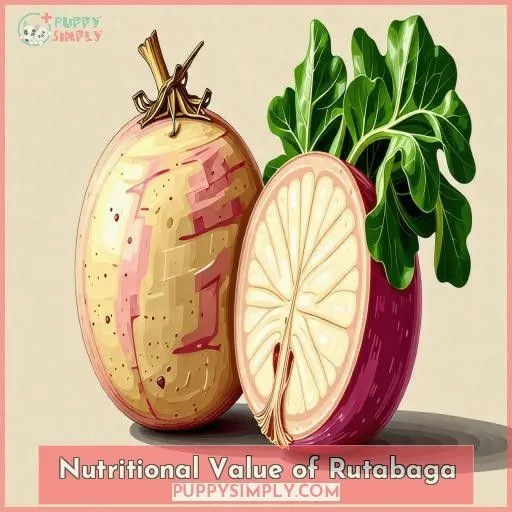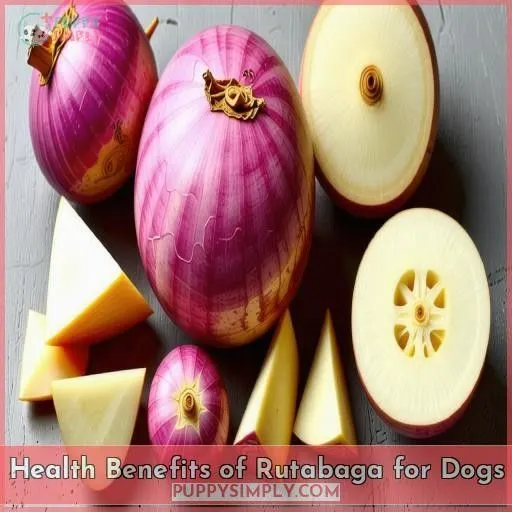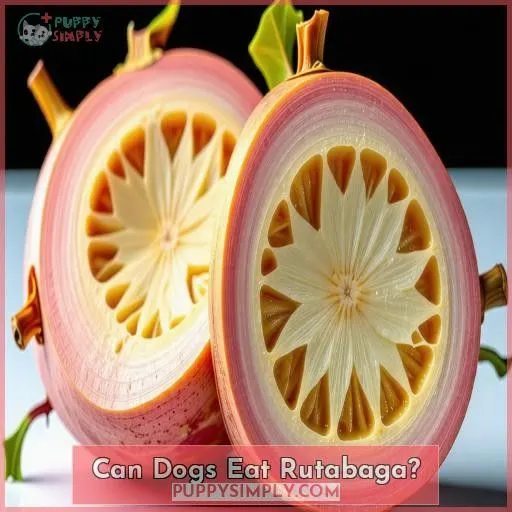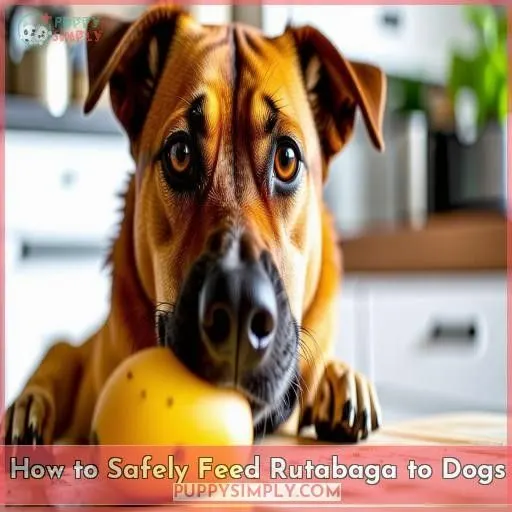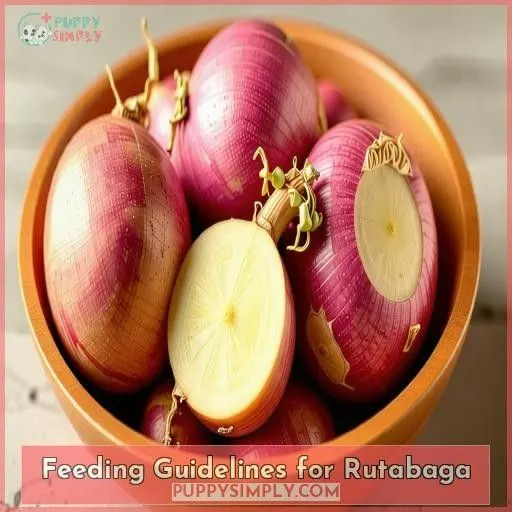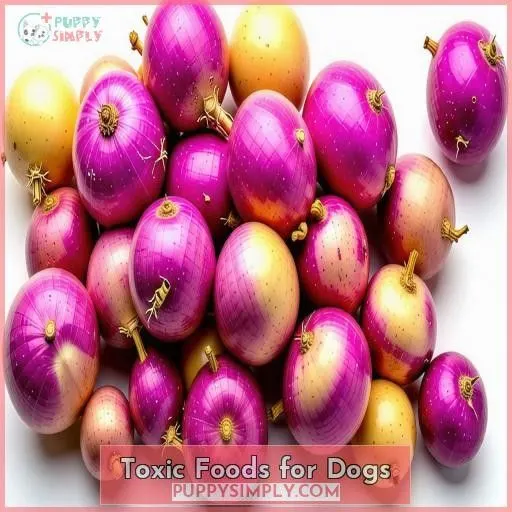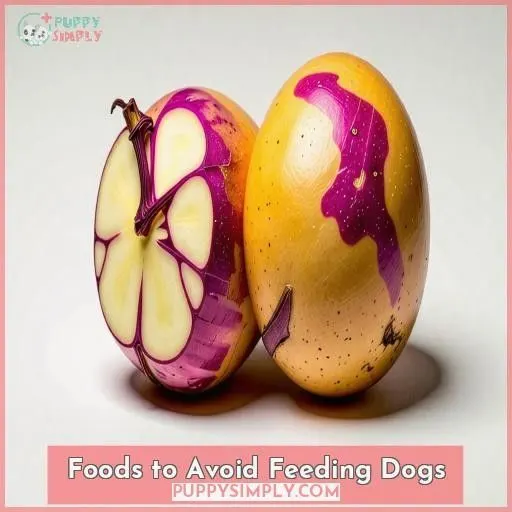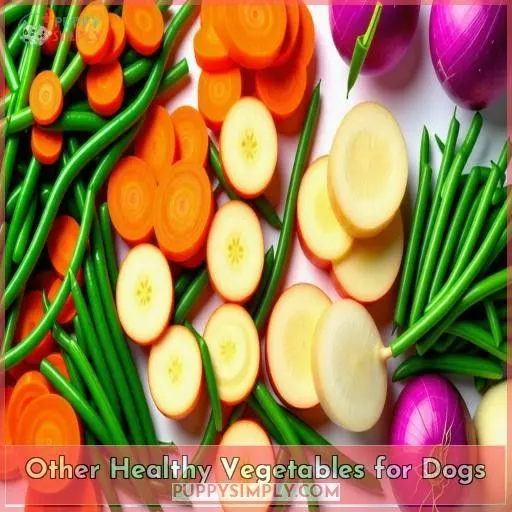This site is supported by our readers. We may earn a commission, at no cost to you, if you purchase through links.
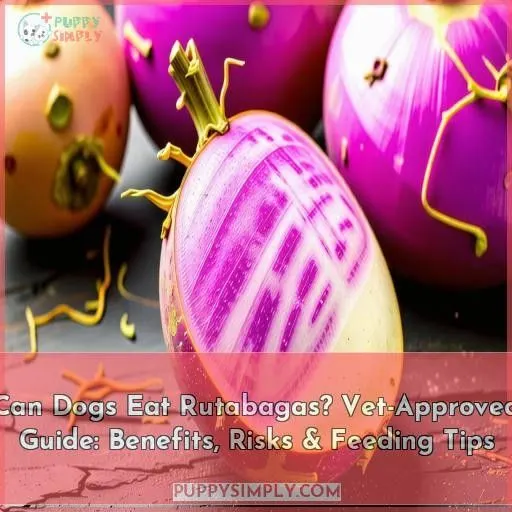 Yes, you can feed dogs rutabagas!
Yes, you can feed dogs rutabagas!
These nutrient-dense veggies are an excellent source of fiber, vitamins C, E, and K, and minerals like manganese.
In moderation, rutabagas can boost your pup’s immune system, aid digestion, and even support weight loss.
Properly prepare them by washing, chopping into bite-sized pieces, and cooking without added oils or seasonings.
Always check with your vet first and introduce rutabagas gradually.
Monitor your furry friend’s reaction – if they handle rutabagas well, you’ve found a healthy treat option.
But explore more to learn ideal portions and other dog-friendly veggies.
Table Of Contents
- Key Takeaways
- Can Dogs Eat Rutabagas?
- What is Rutabaga?
- Nutritional Value of Rutabaga
- Health Benefits of Rutabaga for Dogs
- Can Dogs Eat Rutabaga?
- How to Safely Feed Rutabaga to Dogs
- Feeding Guidelines for Rutabaga
- Toxic Foods for Dogs
- Foods to Avoid Feeding Dogs
- Other Healthy Vegetables for Dogs
- Frequently Asked Questions (FAQs)
- Do dogs like rutabaga?
- What root vegetables can dogs eat?
- What vegetables are not toxic to dogs?
- What is the healthiest vegetable for dogs?
- Can rutabagas cause digestive issues in dogs?
- What other vegetables are harmful to dogs?
- Are rutabagas high in calories?
- Can rutabagas lead to weight gain in dogs?
- How should rutabagas be prepared for dogs?
- Conclusion
Key Takeaways
- Dogs are barking up the right tree when it comes to rutabagas! These unsung heroes pack a nutrient-dense punch, offering vitamins, minerals, and fiber galore to support your pup’s immune system, digestion, and even weight loss goals. Just remember, moderation is key – no going overboard on the rutabaga buffet!
- Introducing rutabagas to your furry friend is like a first date – take it slow, and pay attention to any red flags. Start with small portions, and keep a watchful eye for signs of digestive distress or allergic reactions. Rome wasn’t built in a day, and neither is a dog’s love for rutabagas!
- Preparing rutabagas for your pup is like a culinary dance – wash, chop, and cook without any fancy footwork like spices or oils. Steaming, boiling, or roasting are all fair game, but remember, the simpler the better when it comes to your dog’s digestive system.
- While rutabagas are a nutritious treat option, variety is the spice of life (and your pup’s diet). Don’t be a one-trick pony – mix things up with other veggies like carrots, green beans, and sweet potatoes to keep your furry friend’s taste buds and health on their toes.
Can Dogs Eat Rutabagas?
Yes, dogs can eat rutabagas in moderation as an occasional treat. Rutabagas are low in calories and rich in vitamins C, E, and K, as well as fiber and minerals like manganese, potassium, and phosphorus, which can provide health benefits for dogs.
What is Rutabaga?
Rutabagas, also known as Swedish turnips, are a type of root vegetable that’s safe for dogs to eat in moderation. These nutritious veggies are related to turnips and cabbage, with a sweet, earthy flavor that can add variety to your pup’s diet.
While rutabagas offer several health benefits for dogs, it’s important to introduce them gradually and consult with your veterinarian before making any significant changes to your canine companion’s meal plan.
With proper preparation and portion control, rutabagas can be a tasty and healthy treat for your furry friend.
Nutritional Value of Rutabaga
Rutabagas are an excellent source of essential nutrients, boasting a wealth of vitamins C, E, and K, as well as fiber and minerals like manganese, potassium, and phosphorus. Despite their impressive nutritional profile, rutabagas are low in calories, making them a nutrient-rich treat for your furry friend.
Rich in Vitamins C, E, and K
Rutabaga is an exceptional source of vitamins C, E, and K, contributing to your dog’s general health and well-being, including supporting the immune system, safeguarding against oxidative damage, and aiding in blood clotting. These vitamins are essential for ideal health, and incorporating rutabaga into your dog’s diet can have numerous benefits for their nutrition and immune system .
High in Fiber
Rutabaga’s high fiber content promotes healthy digestion and regular bowel movements in dogs. The fiber also helps with weight management by making your pup feel fuller for longer. Fiber is great for gut health and can even improve dental hygiene and skin condition.
Contains Minerals Like Manganese, Potassium, and Phosphorus
Rutabaga, safe for dogs, boasts significant minerals: manganese, potassium, and phosphorus. These nutrients contribute to overall health. When considering feeding rutabaga to your furry friend, remember its rich mineral content, ensuring a balanced diet. Introducing rutabaga gradually helps monitor digestion and utilization of these essential minerals.
Low in Calories
Rutabagas are a low-calorie vegetable, making them ideal for dogs watching their weight. Their fiber content also promotes healthy digestion. Enjoy rutabagas year-round, storing them in the fridge for up to 2 weeks. Substitute with turnips or parsnips for similar nutritional benefits.
Health Benefits of Rutabaga for Dogs
You might want to examine adding rutabaga to your dog’s diet, as it offers several health benefits. Rutabaga boosts the immune system, protects against oxidative damage, aids in blood clotting, promotes regular bowel movements, and may even help with weight loss in dogs.
Boosts the Immune System
Rutabaga’s nutritional value benefits your dog by boosting the immune system. It aids in blood clotting and provides a good source of vitamin C. Incorporating rutabaga into your dog’s diet can contribute positively to their overall health.
- Boosts the immune system
- Supports blood clotting
- Rich in vitamin C
- Enhances nutritional value
Protects Against Oxidative Damage
Rutabaga’s antioxidant properties, thanks to vitamins C and E, help neutralize free radicals and protect cells from oxidative damage. Its fiber and mineral content further support your dog’s overall health and nutrition .
Aids in Blood Clotting
Rutabaga’s vitamin K content aids blood clotting, preventing vitamin K deficiency and anemia in dogs. Its low calories make it a healthy snack for weight loss. Incorporate rutabaga gradually into your dog’s diet to reap these benefits.
Promotes Regular Bowel Movements
Rutabaga’s high fiber content promotes regular bowel movements in dogs. Cooked or raw rutabaga can help regulate digestion. If your dog dislikes rutabaga, try alternatives like pumpkin or sweet potato for similar fiber benefits (Source).
May Aid in Weight Loss
Rutabaga, rich in fiber, aids digestion and may support weight loss in dogs when introduced gradually. Organic rutabaga serves as a nutritious treat, promoting regular bowel movements and potential weight management. Make sure to monitor your dog’s response when including rutabaga in their diet .
Can Dogs Eat Rutabaga?
Yes, dogs can safely eat rutabagas in moderation. This root vegetable is packed with essential vitamins, minerals, and fiber that support your dog’s overall health. Rutabagas are low in calories and rich in vitamins C, E, and K, which boost the immune system, protect against oxidative damage, and aid in blood clotting . However, it’s important to monitor your dog’s reaction and introduce rutabagas gradually, as some dogs may have sensitivities . Always consult with your veterinarian before adding new foods to your dog’s diet.
- Rutabagas are a healthy treat option for dogs
- Rutabagas are low in calories and rich in essential vitamins and minerals
- Rutabagas provide fiber for digestive health and may aid in weight loss
- Consult with your veterinarian before feeding rutabagas to your dog
How to Safely Feed Rutabaga to Dogs
To guarantee your dog can safely enjoy the nutritional benefits of rutabaga, it’s imperative to buy organic and thoroughly wash the vegetable before feeding. Proper preparation involves cutting rutabaga into small pieces to prevent choking, cooking it through steaming, boiling, or roasting without adding spices or oils, and gradually introducing it to your pup’s diet while monitoring their digestion.
Buy Organic Rutabaga
Buy organic rutabaga from your local farmers market for a pesticide-free, sustainable option packed with nutrients your dog will love in moderation.
Wash Thoroughly Before Feeding
Wash organic rutabaga thoroughly before feeding to remove any dirt or pesticides. Introduce rutabaga gradually and leave out spices when cooking to avoid digestive upset.
Cut Into Small Pieces to Avoid Choking
To prevent choking, cut rutabaga into bite-size pieces. Proper portion sizes aid digestion. Monitor your dog’s reaction when introducing rutabaga to their diet.
Cook by Steaming, Boiling, or Roasting
Rutabaga can be safely cooked by steaming, boiling, or roasting. Always use organic rutabaga and avoid adding spices or oils when cooking for your dog .
Leave Out Spices and Oils When Cooking
When cooking rutabaga for dogs, make sure you exclude spices and oils. This practice maintains the nutritional benefits and keeps it safe for consumption, preventing potential digestive issues and allergies. Seek veterinary consultation if uncertain.
- Retain nutritional benefits
- Ensure safe cooking methods
- Prevent digestive effects
- Minimize potential allergies
Introduce Gradually and Monitor Digestion
Introduce rutabaga slowly, starting with small amounts. Monitor your pup closely for any signs of digestive upset or allergic reactions. Adjust portions based on your dog’s individual limitations and benefits.
Feeding Guidelines for Rutabaga
Before integrating rutabaga into your dog’s diet, it’s essential to consult with your veterinarian.
They can provide tailored advice based on your pet’s health condition and nutritional needs.
Treat rutabaga as an occasional snack rather than a regular part of your dog’s meals.
Closely monitor their reaction to this new food, watching for any potential digestive issues or adverse effects.
Contact Your Veterinarian Before Feeding Rutabaga to Your Dog
Before introducing rutabaga to your dog, prioritize a veterinary consultation to verify safety. Establish a healthy feeding routine by monitoring for digestive issues, especially if considering raw rutabaga or organic sourcing. Your veterinarian can advise on potential allergy testing and guide you on the best approach for incorporating rutabaga into your dog’s diet effectively. Your pet’s well-being is paramount, so seek professional advice for ideal care.
- Emphasize veterinary consultation before feeding
- Monitor digestive issues carefully
- Consider allergy testing if needed
- Prioritize your pet’s well-being with expert guidance (Source)
Offer Rutabaga as an Occasional Treat
Rutabaga makes a great occasional treat for your pup! Just be mindful of portion control to avoid digestive upset. Offering rutabaga as part of a balanced diet promotes dietary variety and supports your dog’s overall health. Always consult your vet before introducing new foods. Enjoy this crunchy, nutrient-dense veggie together in moderation!
| Occasional Treats | Portion Control | Dietary Variety | Balanced Diet | Digestive Health |
|---|---|---|---|---|
| Rutabaga is a fun | Stick to small | Adding rutabaga | Rutabaga is a | Fiber-rich ruta- |
| occasional treat | portions to | to your dog’s | great addition | baga supports |
| for dogs | avoid overfeeding | regular meals | to a balanced | digestive health |
| when fed in | and digestive | adds nutritional | diet, not a | when fed in |
| moderation | upset | variety | replacement | moderation |
Monitor Your Dog’s Reaction to Rutabaga
When introducing rutabaga to your pup, watch for signs of digestive upset or allergies. Observe your dog closely after feeding rutabaga. If you notice vomiting, diarrhea, or skin irritation, discontinue use and consult your vet. Proper portion sizes and cooking methods are key to avoiding tummy troubles and maximizing rutabaga’s health benefits for your canine companion.
Toxic Foods for Dogs
You should never feed your dog alcohol, chocolate, coffee, tea, grapes, raisins, sultanas, or macadamia nuts as these foods are toxic and can lead to serious health issues. While some human foods are safe for dogs in moderation, it’s necessary to know which ones to absolutely avoid to prevent accidental poisoning and guarantee your furry friend’s well-being.
Alcohol
Alcohol is highly toxic to dogs and can cause serious health issues like vomiting, diarrhea, coordination problems, breathing issues, coma, and even death. Keep alcoholic beverages far away from your furry friend to avoid these dangerous risks .
Chocolate
Chocolate is highly toxic to dogs. It can lead to chocolate poisoning, causing symptoms like vomiting, diarrhea, rapid breathing, and seizures. Make sure to keep all chocolate, including dark, milk, and white chocolate, away from your furry friend. Opt for safe treats like carrots or apples instead. (Source)
Coffee and Tea
Coffee and tea contain caffeine, which is toxic to dogs. Avoid feeding coffee beans, tea leaves, or any products containing coffee or tea. Ingestion can cause vomiting, diarrhea, restlessness, rapid breathing, heart palpitations, and seizures in dogs .
Grapes, Raisins, and Sultanas
Grapes, raisins, and sultanas are highly toxic to dogs, causing kidney failure. Avoid feeding these foods to your pup at all costs. Consult your vet immediately if your dog ingests grapes, raisins, or sultanas .
Macadamia Nuts
Macadamia nuts are highly toxic to dogs, causing weakness, tremors, and fever. Avoid feeding these nuts to your furry friend. Instead, opt for healthy, pet-friendly treats like carrots, green beans, or homemade dog biscuits. Your dog’s safety is paramount.
- Macadamia nuts are extremely toxic to dogs
- Symptoms include weakness, tremors, and fever
- Never feed macadamia nuts to your pet
- Offer safe, healthy treats like carrots or green beans
Foods to Avoid Feeding Dogs
You should avoid feeding your dog bones from fish, poultry, or other meat sources, as they can splinter and cause internal injuries or obstructions. Similarly, rawhide bones, fat trimmings from ham and other meats, onions, and raw potatoes should be kept away from your dog’s diet, as they can lead to digestive issues, toxicity, or other health problems.
Bones From Fish, Poultry, or Other Meat Sources
Harmful foods for dogs include bones from fish, poultry, or other meat sources, as these can splinter and cause internal injuries. Instead, offer safe vegetables like rutabagas and consider nutritional supplements as alternative treats. Always prioritize your dog’s well-being.
Rawhide Bones
Avoid discussing things which would be discussed in the NEXT SUBTOPIC entitled ‘Onions‘.
Fat Trimmings From Ham and Other Meats
Fat trimmings from ham and other meats are off-limits for dogs. These fatty scraps can trigger pancreatitis, a painful and potentially life-threatening condition. Stick to lean, dog-safe proteins and avoid feeding table scraps to keep your pup healthy and happy.
| Storage Methods | Freezing Techniques | Thawing Process | Serving Suggestions | Different Varieties |
|---|---|---|---|---|
| Refrigerate | Wrap tightly | Overnight | Cooked | Pork |
| Airtight | Freeze flat | Room temp | Unseasoned | Beef |
| Cool, dry place | Portion out | Microwave | Bite-sized | Turkey |
| Pantry | Vacuum seal | Fridge | Sprinkle | Chicken |
| Freezer | Label | Cold water | Mix in | Fish |
Onions
Onion consumption by dogs can lead to toxicity levels, digestive issues, and severe health implications. Avoid feeding dogs onions to prevent potential harm. Explore safe substitutes to keep your furry friend healthy and happy.
Raw Potatoes
Raw potatoes contain solanine, a toxic compound that can cause digestive issues and neurological problems in dogs. Opt for safer potato alternatives like sweet potatoes or cooked, peeled potatoes in moderation as part of a balanced diet.
Other Healthy Vegetables for Dogs
While rutabagas can be a nutritious addition to your dog’s diet, it’s equally important to incorporate other healthy vegetables. Carrots are an excellent source of vitamin A, celery provides a low-calorie, crunchy texture, green beans offer fiber and low calories, sweet potatoes are rich in vitamins and minerals, and broccoli is high in vitamins A and C.
Carrots: Vitamin a Source
Carrots are an excellent source of vitamin A for dogs. They support eye health and immune function. Rutabagas and carrots provide essential nutrients in a tasty, crunchy treat. Consult your vet before adding rutabagas or carrots to your dog’s diet .
Celery: Low-calorie, Crunchy
Celery is a low-calorie, crunchy veggie that dogs love. It aids digestion and makes a great snack. Slice into sticks for easy chewing. Avoid feeding the leaves, as they may cause digestive upset.
| Nutrient | Amount |
|---|---|
| Calories | 16 |
| Fiber | 1.6 g |
| Vitamin K | 16 mcg |
Green Beans: Fiber-rich, Low-calorie
Green beans are a fantastic low-calorie, fiber-rich veggie for dogs. They provide:
- Essential vitamins and minerals
- Crunchy texture for dental health
- Feeling of fullness to aid weight management
- Variety in your pup’s diet
Sweet Potatoes: Rich in Vitamins and Minerals
Sweet potatoes are a nutritious choice, rich in vitamins A and C, as well as minerals. They provide fiber and antioxidants, making them a healthy addition to your dog’s diet in moderation. Consult your vet before introducing new foods.
Broccoli: High in Vitamins a and C
Broccoli is another veggie that’s great for dogs. It’s packed with vitamins A and C, which support eye health and immune function. Serve broccoli raw or lightly cooked for maximum nutrition and digestibility.
Frequently Asked Questions (FAQs)
Do dogs like rutabaga?
You’ve heard the adage, One man’s food is another’s poison. Well, rutabagas may not be a dog’s favorite treat – some pups love them, while others turn up their noses. It’s best to introduce them slowly and monitor your pup’s reaction.
What root vegetables can dogs eat?
You can safely feed dogs carrots, sweet potatoes, pumpkin, parsnips, and beets in moderation. Introduce these root veggies slowly, and monitor for any digestive issues. Moderation is key, as too much can cause an upset stomach.
What vegetables are not toxic to dogs?
Isn’t it ironic that we fret over vegetables being toxic for dogs when chocolate and alcohol pose far graver risks? Carrots, green beans, and sweet potatoes are generally safe, offering fiber and vitamins.
What is the healthiest vegetable for dogs?
The healthiest veggie for dogs? Sweet potatoes! Packed with fiber, antioxidants, and vitamins A, C, and B They support digestion, immune function, and vision – a nutrient powerhouse your pup will happily devour.
Can rutabagas cause digestive issues in dogs?
Yes, rutabagas can potentially cause digestive issues in dogs if introduced too quickly or in large amounts. Start with small portions and monitor your pup’s reaction before increasing. Moderation is key when feeding new vegetables.
What other vegetables are harmful to dogs?
Surprised? Some vegetables, like onions and mushrooms, can harm your furry friend. Onions cause anemia, while certain mushrooms are downright toxic. Keep your pup safe by avoiding these veggies altogether.
Are rutabagas high in calories?
No, rutabagas are low in calories, making them an excellent treat for overweight dogs. A half-cup of cooked rutabaga contains only 24 calories.
Can rutabagas lead to weight gain in dogs?
Feeding rutabagas to dogs won’t lead to weight gain. They’re low-calorie, high-fiber veggies that can aid weight loss when given in moderation as treats. Consult your vet first before introducing new foods to your pup’s diet.
How should rutabagas be prepared for dogs?
To prepare rutabagas for dogs, peel and slice them into bite-sized pieces. You can steam, boil, or roast them without added seasonings or oils. Gradually introduce rutabagas to prevent any digestive issues in your pup.
Conclusion
Like a well-tended garden, your dog’s diet can flourish with the judicious addition of nutrient-rich rutabagas.
While consulting your vet remains paramount, you now possess the knowledge to safely incorporate this veggie as an occasional treat.
Embrace rutabagas as a path to boosting your canine companion’s immune system, digestion, and overall well-being, while being mindful of proper portions.


